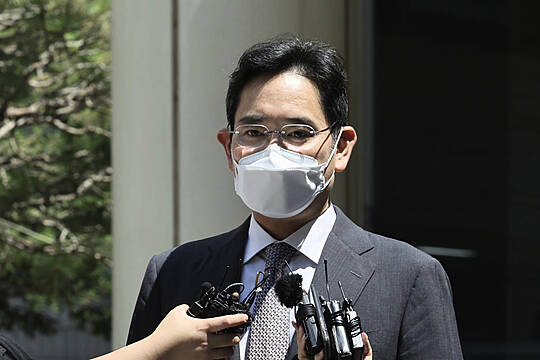South Korea’s president will formally pardon Samsung heir Lee Jae-yong, one year after he was released on parole from a prison sentence for bribing former President Park Geun-hye as part of a corruption scandal that toppled Ms Park’s government.
Lotte Group chairman Shin Dong-bin and two other top business leaders will be pardoned as well.
They are among some 1,700 people President Yoon Suk Yeol will pardon on Monday, a national holiday celebrating Korea’s liberation from Japanese colonial rule at the end of the Second World War.
The pardon of Lee, who was released on parole in August 2021 with a year left on his 30-month term, underscores Samsung’s huge influence over a country that relies on its technology exports.
He was convicted of bribing Park and her close confidante, who were both sentenced to lengthier prison terms, to win government support for a 2015 merger between two Samsung affiliates that tightened Lee’s control over the corporate empire.
Lotte’s Shin Dong-bin received a suspended prison term in 2018 on similar charges of bribing Park, whom then-President Moon Jae-in pardoned in December. Other business leaders to be pardoned are Chang Sae-joo, chairman of Dongkuk Steel Mill, and former STX group chairman Kang Duk-soo.
Justice Minister Han Dong-hoon said the pardons of the business tycoons were aimed at “overcoming the economic crisis through encouraging business activity”.
Lee, 54, runs the Samsung group in his capacity as vice chairman of Samsung Electronics, one of the world’s largest makers of computer memory chips and smartphones.
In a statement released through Samsung, Lee said he expresses his sincere gratitude for “receiving an opportunity to start anew”.
“I want to express my apologies for causing concerns for many people because of my shortcomings. I will work even harder to fulfill my responsibilities and duties as a businessperson,” Lee said.
Lee still faces a separate trial on charges of stock price manipulation and auditing violations related to the 2015 merger.
A coalition of civic groups, including People’s Solidarity for Participatory Democracy, issued a statement criticising the move to pardon Lee Jae-yong and the other business tycoons, accusing the government of cosying up to “chaebol”, referring to the family-owned conglomerates that dominate the country’s economy.
“President Yoon Suk Yeol’s sell-out (to business tycoons) sends a signal to chaebol chiefs that they are free to commit all the crimes they want,” the groups said.
But recent opinion polls have indicated South Koreans largely favored granting Lee a pardon, reflecting Samsung’s influence.
Business leaders and politicians had also called for Lee’s pardon, which they said would allow Samsung to be bolder and quicker in business decisions by fully reinstating his rights to run the business empire.
South Korea’s law bans people convicted of major financial crimes from returning to work for five years following the end of their sentences.
Critics say Lee has always been in control of Samsung, even when he was behind bars, and resumed his management duties following his parole.
Former Justice Minister Park Beom-kye, who served under the Moon government, had defended Lee’s involvement in Samsung’s management following his parole, insisting that his activities were not in violation of the five-year ban because the billionaire heir was not receiving wages from Samsung.
Park Geun-hye was convicted of a broad range of corruption crimes, including colluding with her longtime confidante, Choi Soon-sil, to take millions of dollars in bribes and extortion from Samsung and other major companies while she was in office.
She faced a prison term of more than two decades before Moon pardoned her in December. Choi remains in jail. Chang was released on parole in 2018 with about six months left on a three and a half-year prison term over charges that he embezzled millions of dollars in corporate funds and used some of it to gamble in Las Vegas.
South Korea’s Supreme Court last year confirmed a suspended prison sentence for Kang, who headed STX from 2003 to 2014, on charges of embezzling corporate funds and other crimes.
Lee was convicted of taking bribes from big businesses including Samsung, embezzling funds from a company that he owned, and other corruption-related crimes before and during his presidency from 2008 to 2013.







